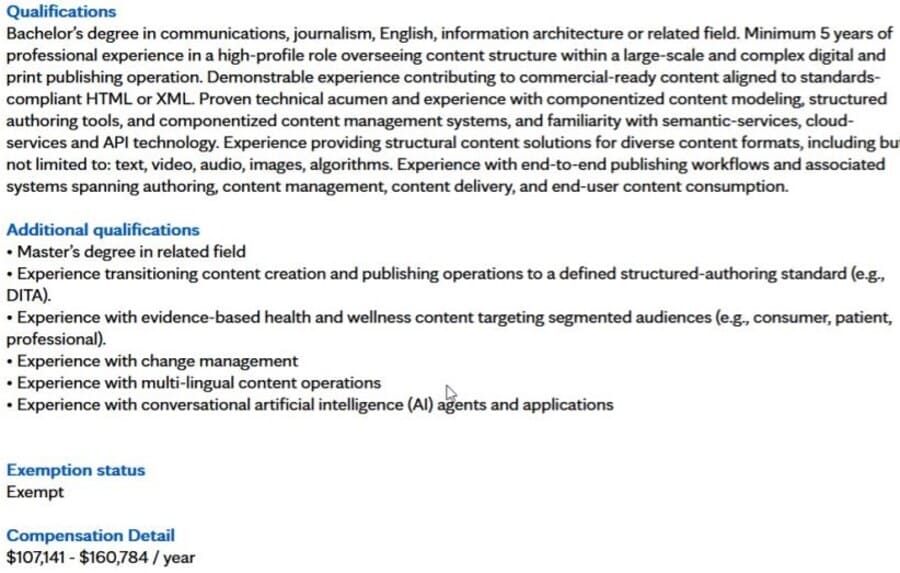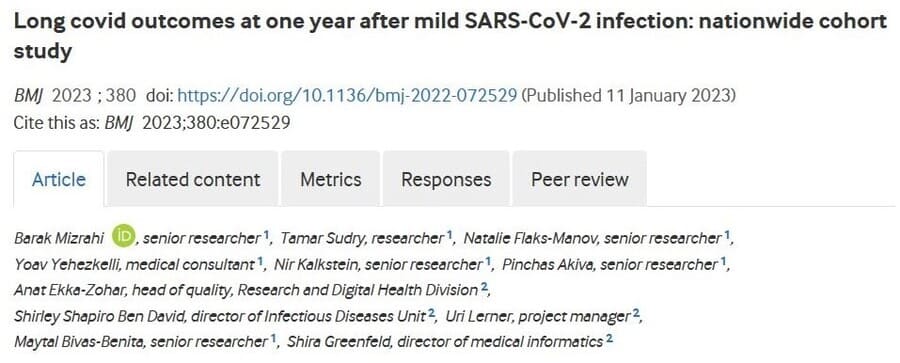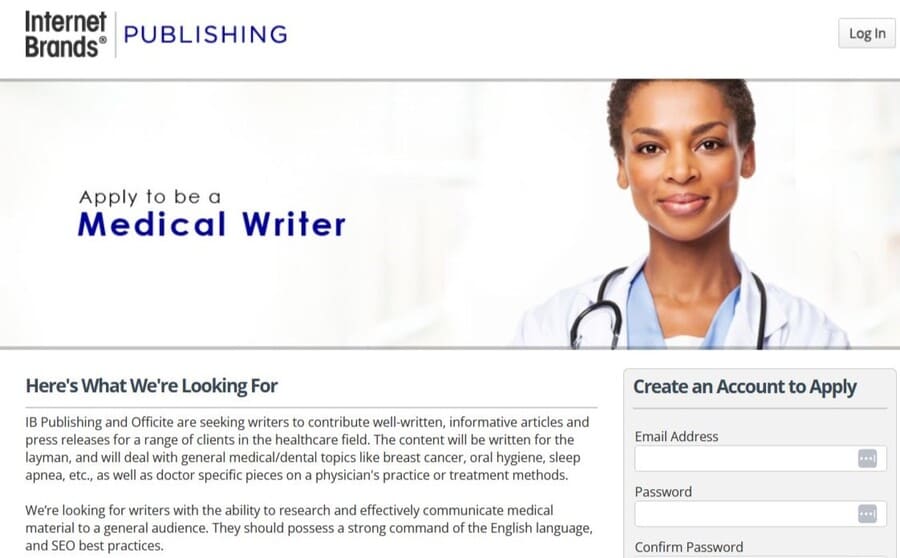Searching for medical writing jobs on Google can feel like a roller coaster.
The idea of earning decent money as a medical writer is exhilarating, but the job requirements can make your heart drop. Every job requires at least a bachelor’s degree in life sciences — and some require a doctorate.
Also, even “beginner” jobs require work experience. How can you get work experience without a job?
It’s frustrating.
But there is hope.
Obviously, someone without a college education or writing experience can’t immediately earn a high income as a medical writer. But a good job is possible for writers with patience and a strong work ethic.
We’ll look at examples of medical writing jobs and discuss some benefits and disadvantages. Then we’ll cover how you can get a job and include tips from multiple writers.
Let’s dig in.

What is Medical Writing?
This complicated industry can be confusing. For example, there are two definitions of medical writing, and one is much broader than the other.
The broad definition includes all writing in the medical industry, from short advertisements to large medical textbooks. It also includes editing and proofreading.
By comparison, the narrow definition of medical writing involves creating technical medical documents such as clinical regulatory documents. Since these jobs are so technical, some writers may find them boring.
To see if you could stand working with technical documents day after day, here’s a document written in 2010.
It’s outdated, but it can help you decide if you could be a technical writer.
So, whether you want to work with technical documents or not, you will find many writing jobs in the medical field.
But you may wonder if these options are good.
Is Medical Writing a Good Career?

The medical writing industry has a great outlook.
The worldwide market for technical medical writers was about $3.7 billion in 2021 and it is expected to grow to over $6.5 billion by 2026. This doesn’t include positions such as writing advertisements or blog posts.
Also, many medical writing jobs have a high salary, especially if you’re a senior medical writer.
However, every advantage has a disadvantage and jobs with high income involve high responsibility. Therefore, remember these points:
You’ll Face Competition
There is significant competition for medical writing jobs. For example, medical doctors who burn out often compete for the most lucrative medical writing jobs.
Focus is Critical
Due to the high competition and wide variety of positions available, unfocused writers will struggle. So focus on a niche.
You Need to Learn Constantly
The information in this field endlessly grows and evolves. While some writers find this exciting, those who don’t constantly learn and grow will soon become irrelevant.
Skilled Writers Can Earn A Lot
Medical companies need writers who can create engaging, medically authoritative, and SEO-optimized content. These writers can earn much more than the average writer, especially if they specialize in a niche.
So while medical writing jobs aren’t easy, they are great for writers who can get them.
How to Get a Medical Writing Job

There are four keys to getting a medical writing job:
- Credentials — Degrees and certificates.
- Skills — The ability to efficiently craft high-quality content.
- Results — A portfolio, statistical results, and testimonials.
- Trust — Influential people know, like, and trust you.
These elements may offset each other. For example, you may not need the typical credentials to work under a senior medical writer who knows and trusts you.
Also, managers who like you — and trust you’ll stick around — are more likely to hire you for positions where they will need to train you.
Just remember that independently developing your writing skills increases your earning potential.
Speaking of skill development, some medical writing jobs require a college degree. But anyone can increase their chances of getting a job by following these steps:
- Choose a medical writing niche.
- Identify the documents written in that niche.
- Study the word choice and formatting of real-world writing examples.
- Read books and take courses on writing and medical terminology. Udemy, Coursera, and LinkedIn Learning have low-cost options.
- Write on a personal account such as Medium.
- Network with writers and editors.
- Get feedback on your writing. This may involve volunteering, hiring an editor, or finding a mentor.
- Apply to any job you could be qualified for. Use the process to learn how to increase your chances of getting a good job.
As you begin this process and learn about medical niches, remember that there are three categories of medical writing jobs.
The 3 Types of Medical Writing Jobs
The three categories of jobs for a medical writer are medical copywriting, medical content writing, and research and regulatory writing.
Let’s start with the first one.
Medical Copywriting
Medical copywriters write advertising and marketing content such as the script for the video above. They work for clinics, pharmaceutical and medical device companies, and health care organizations.
With this variety, medical copywriters have many career options.
Specific Niches
A medical copywriter can specialize in two ways. First, you could specialize in a topic such as the following:
- Medical aesthetics
- Optometry
- Pharmaceuticals
- Ultrasound
- Nutrition
You could also specialize in a type of copywriting such as these:
- Direct response
- User experience (UX)
- Social media
The opportunities (and pay) you find for each niche depends on your writing and networking abilities. Overall, copywriters are well-compensated.
Salary Range
Beginner medical copywriters earn between $60,000 and $80,000, and senior copywriters earn roughly $70,000 to $110,000. Freelance copywriters who can create great copy earn over six figures.
Frankly, the salary potential for copywriters is unlimited. This episode of the Geniuses of Copywriting podcast (1:32:55), discusses how top copywriters typically own a part or all of the companies they write for.
But before you can earn money, you need a job.
Job Requirements
There are two main situations when medical copywriters typically need a college degree:
- When working for a copywriting agency.
- If the target customer is a medical business (“B2B copywriting”).
Otherwise, you generally don’t need a college degree to become a medical copywriter.
Freelance copywriter Ruby Emery writes for the health and wellness niche. She says that, while a degree is necessary for B2B copywriting, medical copywriters only need a good portfolio and an understanding of the target customer to write copy for a general patient audience.
Even if you don’t have a college degree, these tips may help you.
Tips for Beginners
Jon Morrow suggests that aspiring copywriters write for the most influential client that will accept them at a volunteer or discounted rate. The resulting experience and referrals will allow you to significantly increase your writing rates.
You can also study and practice using copywriting formulas.
As you develop your skills, you can search for jobs with these keywords.
Job Description Keywords
- Advertising associate
- Advertising writer
- Copywriter
- Web content writer
If you’re not interested in advertising, you could write medical content.
Medical Content Writing

Medical writers in this category often work for clinics, newspapers, book publishers, and writing agencies.
In other words, this broad category has many niches.
Specific Niches
Here are some niches you could choose from:
- Ghostwriter for a book by a medical authority
- Medical journalist
- Online blog writer for a clinic or organization
- Creator of patient education materials like these
- Editor of a newspaper, magazine, or blog
- SEO and/or content marketing strategist for a clinic or other medical organization
Many of these are remote jobs. They also pay decently.
Salary Range
A beginner can earn roughly $50,000 to $60,000, as a full-time communications specialist.
And as a senior medical writer with five years of experience, you can earn up to $160,000. For example, here is a content engineer position at Mayo Clinic:

Fortunately, beginner jobs don’t require 5 years of experience.
Job Requirements
Although this content is commonly “medically reviewed,” writers without a medical degree often create the content. These jobs typically require a bachelor’s degree in journalism or communications.
However, you may get a job without a degree if your portfolio demonstrates great writing skills and medical knowledge. You just need the right strategy.
Tips for Beginners
Learn how to write a blog post, study posts on sites like WebMD and Mayo Clinic, and create similar posts on Medium and LinkedIn.
Also, Kristin Hugo, a freelance science journalist who has written for Newsweek and National Geographic, recommends using The Open Network and similar online resources.
A great writing portfolio increases your chances of getting one of the jobs you can find online with various search keywords.
Job Description Keywords
Here are some keywords to use:
- Public health associate
- Medical communications specialist
- Journalist
- Ghost writer
While these jobs are great, you will find mostly research and regulatory jobs when searching for “medical writing jobs.”
Research and Regulatory Writing

This is what a medical professional would call “medical writing.” These positions exist in universities, large clinics, pharmaceutical and medical products companies, and contract research organizations (CROs).
You will also find many writing niches in these companies.
Specific Niches
Here are some niches you could focus on:
- Writing medical research articles (submitted to medical journals)
- Regulatory approval for pharmaceuticals or other medical devices
- Grant proposal writer
- Medical textbook author
- Medical patent application writer
- Healthcare government policy writer
And here are some documents you may write:
- Clinical Investigational Report
- Clinical Study Report (CSR)
- Investigational Medicinal Product Dossier (IMPD)
- Marketing Authorization Applization (MAA)
- New Drug Application (NDA)
- Periodic Benefit-Risk Evaluation Report (PBRER)
- Periodic Safety Update Report (PSUR)
These documents have big words, but a medical writer who creates them can earn a large paycheck.
Salary Range
According to Zippia, a technical medical writer earns between $63,000 and $137,000, with a median income of $93,000.
These writers often create government regulatory documents, and jobs with the highest average are in Washington D.C. ($129,000) and Virginia ($110,000).
While the income is high, it may take a while to meet the job requirements.
Job Requirements
Research and regulatory writers typically have a bachelor’s degree in life sciences, as well as writing experience.
Zachary Weaver is a postgraduate student in a master’s of public health (MPH) program.
He states that research and regulatory writing jobs often require advanced degrees (MPH, PharmD, MD, etc.) because companies know that students in those programs write many technical medical papers.
However, writers without advanced degrees could get a job in this field.
Tips for Beginners
Zachary suggests that someone without an advanced degree could become a technical medical writer by first working as a “public health associate.” He says these organizations need writers because they create a lot of content.
In other words, you could earn money developing the skills necessary to get a research and regulatory writing job.
Job Description Keywords
These are keywords for positions you could get before a medical writing job:
- Public health associate
- Grant proposal writer
- Medical research assistant
- Clinical laboratory technologist
- Clinical research coordinator
You can save time and work if you know the right people.
Networking Tips
Trust is important, and networking helps you build it.
Here are some tips:
- Join the American Medical Writers Association or the European Medical Writers Association.
- Use LinkedIn to find a job.
- Join writing groups on Facebook.
- Connect with medical writers and ask for their advice. Consider buying them a coffee or even lunch.
- Always send a thank-you note after people spend their time helping you. A hand-written note works best.
Networking is great. In addition, online searches help you find jobs outside your network.
Where to Find Medical Writing Jobs Online

As you search, don’t limit yourself to large websites like ZipRecruiter and Career Builder.
These sites also have helpful job boards:
And here are the keywords to use:
- Medical Copywriter: Advertising associate, advertising writer, copywriter, and web content writer.
- Medical Content Writer: Medical communications specialist, ghost writer, journalist, and public health associate.
- Research and regulatory writing (aka “medical writing”): Public health associate, grant writer, clinical laboratory technologist, and think tank internship.
You can also look for editing and proofreading jobs in medical companies.
As you search for a job, remember this:
People Get Medical Writing Jobs With Lots of Practice
Searching for medical writing jobs doesn’t need to be frustrating when you have a plan.
Choose a medical writing specialty and start networking. Then build your portfolio by creating documents from that specialty.
Keep learning and practicing, whether in college, on Medium, or elsewhere.
As you develop your portfolio and network, look for paid and unpaid opportunities to get feedback on your skills as a medical writer.
Soon you’ll have the credentials, skills, results, and trust to get a well-paying job. So if medical writing job searches frustrate you, here’s a solution:
Stop searching and start writing.
The post Medical Writing Jobs 101: How to Find a Great Job (& Get Hired) appeared first on Smart Blogger.

No comments:
Post a Comment